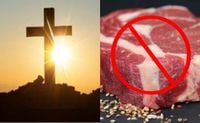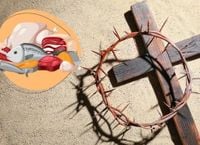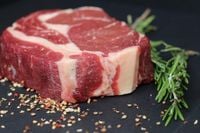The Catholic celebration of Semana Santa (Holy Week) in 2025 will be observed from April 13 to April 20, with significant days highlighting the religious observances. Domingo de Ramos (Palm Sunday) falls on April 13, Jueves Santo (Holy Thursday) on April 17, and Viernes Santo (Good Friday) on April 18, culminating with Sábado de Gloria (Holy Saturday) on April 19 and concluding with Domingo de Resurrección (Resurrection Sunday) on April 20.
During this sacred week, one of the most deeply rooted traditions is the abstinence from eating red meat, particularly on Viernes Santo, which is a day of mourning commemorating the crucifixion of Jesus Christ. This practice is not only a matter of tradition but also a profound act of spiritual reflection that invites personal sacrifice and solidarity with those less fortunate. The abstention from red meat is seen as a gesture of respect and commemoration of Jesus's sacrifice, reflecting a desire to return to a more humble lifestyle in honor of His life.
According to the Código de Derecho Canónico (Code of Canon Law), Catholics are required to abstain from consuming red meat on Good Friday, a rule that applies to all faithful who have reached the age of fourteen. This day, along with Miércoles de Ceniza (Ash Wednesday), is marked as obligatory for fasting and abstinence, emphasizing the spiritual significance of these practices.
While many extend this practice to include Jueves Santo and all Fridays during Lent as a form of penitence, it is not mandated. Instead, the focus remains on Good Friday, where the consumption of red meat is avoided as it symbolizes the body of Christ crucified. The Church encourages the faithful to reflect on their spiritual journey during this time, often opting for meals centered around fish, vegetables, or legumes instead.
Fish dishes, particularly, have become a staple during Semana Santa. For instance, fresh hake is a popular choice, priced between $6,000 and $12,000, while alternatives like abadejo (hake) and brótola (hake) range higher, with costs varying from $11,200 to $26,000 per kilo. For those looking for economical options, canned tuna, which can be found for $1,600 to $2,000 per 120-gram can, is recommended as a budget-friendly substitute.
Interestingly, the tradition of not eating red meat is rooted in biblical references, where it is indicated that abstaining from certain foods can foster a spirit of sacrifice and reflection. This practice is not only about dietary restrictions but also about embracing a more spiritual lifestyle that honors the sacrifice of Jesus. The Church's regulations on abstinence serve to unify the faithful in a common practice of penitence, encouraging them to engage in prayer, acts of piety, and charity.
As Semana Santa approaches, many families and communities begin to prepare for this period of reflection. The observance of these traditions varies widely, with some individuals choosing to travel or spend time with family during the holiday, while others dedicate themselves to prayer and attending religious services. This year, as millions gather to commemorate the Passion, Death, and Resurrection of Jesus Christ, the significance of these rituals will resonate deeply within the hearts of the faithful.
In addition to the abstinence from red meat, many are also encouraged to consider how their dietary choices during this time can reflect their values and beliefs. The practice of consuming fish or plant-based meals is not merely a substitute but a way to embody the spirit of humility and renewal that Semana Santa represents. As the faithful navigate these traditions, they are reminded of the importance of sacrifice, community, and spiritual growth.
As the observance of Semana Santa unfolds, participants are encouraged to reflect on their individual practices and consider how they can deepen their connection to the spiritual significance of this time. Whether through prayer, fasting, or sharing meals with loved ones, the essence of Semana Santa lies in its ability to bring people together in a shared experience of faith and reflection.
Ultimately, Semana Santa serves as a reminder of the core tenets of Christianity, inviting believers to engage in a period of introspection and renewal. The traditions surrounding this sacred week not only commemorate the events of Jesus's life but also serve to inspire a collective commitment to living out the values of compassion, sacrifice, and community.









